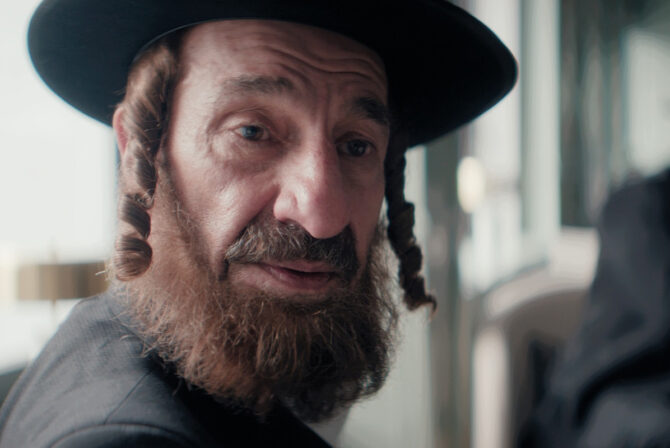None of it really occurred to me until I was sitting in the hospital’s infusion unit, hooked up to my second emergency blood transfusion of the day.
I had already watched one bag of O+ drain into the tube in my right arm and waited as the IV nurse prepped me for the second. And finally, it hit me: Whose blood is this? Male or female? Married or single? What does this person believe? Does it matter? Could it belong to someone I know, like one of the guys in my synagogue who runs the annual blood drive? And finally: Is this, maybe, what it means to save a life?
Let me back up. The changes were so gradual and imperceptible that I barely noticed. But over the course of a few months, I began to feel a number of bizarre physical and intellectual symptoms. I got winded walking from my office to the ladies’ room. In meetings, I suddenly couldn’t find the right words to talk to my colleagues about a field I had worked in for more than 20 years. My tongue was sore; I couldn’t eat anything crunchy or spicy. Over time, this devolved into not being able to eat at all.
READ: The Surprising Way I Found Comfort in My Daughter’s Hospital Room
And then there was the issue of sleep. Sweet, glorious sleep. I wanted to sleep in the same crazy and slightly desperate way a teenage boy wants a girlfriend. And I would do anything to get it. Where I would normally spend a weekend going to Shabbat services, writing, running errands, hanging out with friends, and doing the normal business of living, I suddenly found myself in bed for two days at a time, figuring I would be less tired by the end of the weekend. And then, when I was no less exhausted by the time my alarm went off on Monday morning, I would call in sick.
Obviously, something was very wrong.
Imagine my relief when I found out it was iron-deficiency anemia.
Of course, severe anemia has its complications. By the time I worked up the courage to get looked at by a doctor, fully expecting the worst, my iron levels had fallen so low that I had to be scheduled for an emergency transfusion the same day. From there, I would receive iron by intravenous treatment once a week. And I would have to radically change the way I looked after myself. I would have to eat red meat and leafy greens—even though red meat had been out of my dietary orbit for years, and, well, I hate kale. (There. I said it.)
I had spent most of the 1970s and ‘80s making fun of what my sister and I called “old people pharmaceuticals,” like Metamucil and One a Day Plus Iron. And then I found myself, at 45 years old, facing the shame of buying a regular weekly supply of Geritol at CVS.
And so I sat, kind of amazed and kind of squeamish, watching as a stranger’s O+ flowed into my veins. And I thought about Melanie.
***
In March of 2005, I found myself facing the day that I had always known would come. My father had been diagnosed with heart disease in his 40s, back in 1983. 22 years after his heart bypass surgery, he collapsed in his kitchen. By the time I arrived at the hospital an hour later, it was clear that he would not survive the catastrophic brain hemorrhage.
READ: The Orthodox Woman I Met in the Children’s Hospital
The ICU doctors gently informed us a day later that we had options. Because he was brain dead, because he had failed the apnea test and could not breathe without the help of a respirator, it was only a matter of time. But there was something we could do: We could donate his organs.
My mother and sister said yes immediately. I was the jerk who said no.
To this day, I’m not sure why I said it. Perhaps I just hadn’t accepted the suddenness of it all. Maybe there was some religious prohibition lurking in the back of my mind. Or maybe it was because he had never signed a donor card or the back of his driver’s license.
But for whatever reason, I just couldn’t bring myself to say yes.
And then again, he was a retired New York City homicide detective. He had spent more than 23 years in the department; he had fought against injustice and had put away rapists and psychos and murderers who had wasted their own lives destroying those belonging to other people. Surely if there was a way to save someone’s life, he would want us to do just that.
I went home from the hospital that night and turned to my most trusted source whenever I had a life and death question: Google. I asked it what the Rabbinic sages had to say about organ donation. And every Rabbi agreed: Not only was it the right thing to save a life; it was an obligation. “Whoever saves a life,” it says in the Talmud, “saves an entire world.”
Early the next morning, I gave my consent. By that evening, he was gone. But the doctors had found a match for his liver and his corneas. And there was something sad, grateful, and joyful in their voices as they told us that he had likely saved a life.
***
A few months later, I found myself at work, crying at my desk. Impulsively, I went to the Gift of Life website, where I typed in a quick tribute to my father. I didn’t know if anyone would ever see it, but I wanted the world to know what an amazing person he was: How kind, how funny, how beloved, and how deeply he was missed. And I told the story of how I had initially said no to the organ donation, and how the ancient Rabbinic sages, speaking wisdom centuries old, had convinced me to say yes.
The Facebook message came more than a year later.
“Hi, are you the daughter of Leo Rosenthal? Because I think I am his organ recipient.”
Melanie had found my tribute. She had lined up the dates, times, and locations and figured out that she had gotten the phone call from New York on the day my father died. The next morning, she arrived in New York City for her transplant. She was my age. We had gone to the same graduate school. We had lived a couple of blocks from one another in Philadelphia.
READ: Choosing to Have My Son’s Leg Amputated Was The Most Difficult Decision I’ve Ever Made
She was bright and kind and funny. And she was healthy. Best of all, she had been able to adopt a little girl from Guatemala. Melanie’s life had been on an almost permanent pause just as my father’s came to an end. And because of him, she was able to hit play once again.
The Talmud, as usual, had it right. My dad had saved a life, and an entire world.
When I think of the miracle that this gift really is, it’s mind-boggling. His liver would be 80-years-old now, and yet it goes on steadily working in the body of a 40-something mom and social worker. Whenever we chat or meet up in Philadelphia for dinner, I can’t help but ask my friend if she ever craves vodka martinis or inexplicably has the urge to watch FOX News. (Thankfully, neither of those symptoms have taken hold.) Every time March 11th rolls around, Melanie and I both post on Facebook about being grateful for my dad’s gift. I know she wishes she had known him and that she could thank him for the gift of her life. For me and my family, just knowing she is healthy and happy and strong is gift enough.
Which leads me to this idea: Wouldn’t it be great if people who sign their donor cards and driver’s licenses could receive a gift of time in return for their gift of life? I am currently in the process of asking my local politicians and state senators to consider instituting a special “express line” at the Department of Motor Vehicles, which would allow blood donors and potential organ donors to receive expedited service, enabling them to get some of the time back in their own lives that they are giving to another person, God willing, in the very distant future.
Imagine the lives—and the worlds—that could be saved, if enough people cared about simply saving time at the DMV.
Which brings me back to the anemia. I’m still getting iron (and Geritol, to my great embarrassment) every week, but within two days of my emergency blood transfusion, I was myself again: Clear-headed, energetic, and ready to take on the world. I know I have been given a gift: The gift of health and energy and getting back to the life I am supposed to be leading.
Unlike my friend Melanie, I certainly wouldn’t have died without the transfusion: My body would have slowly healed, or it would have made some sort of course correction, eventually, to get whatever it needed to be healthy again. But perhaps what is most important is discovering that sometimes the right gift comes along just at the moment you need it the most.
READ: The Jewish Reason for Giving All My Stuff Away
And so, whoever you are, whoever was generous enough to give that blood, to sit patiently through that process for nothing more than a cookie and a glass of orange juice, know this: You helped someone, and I am taking very good care of the gift you gave me.
And I thank you. Truly. Thank you so much.








